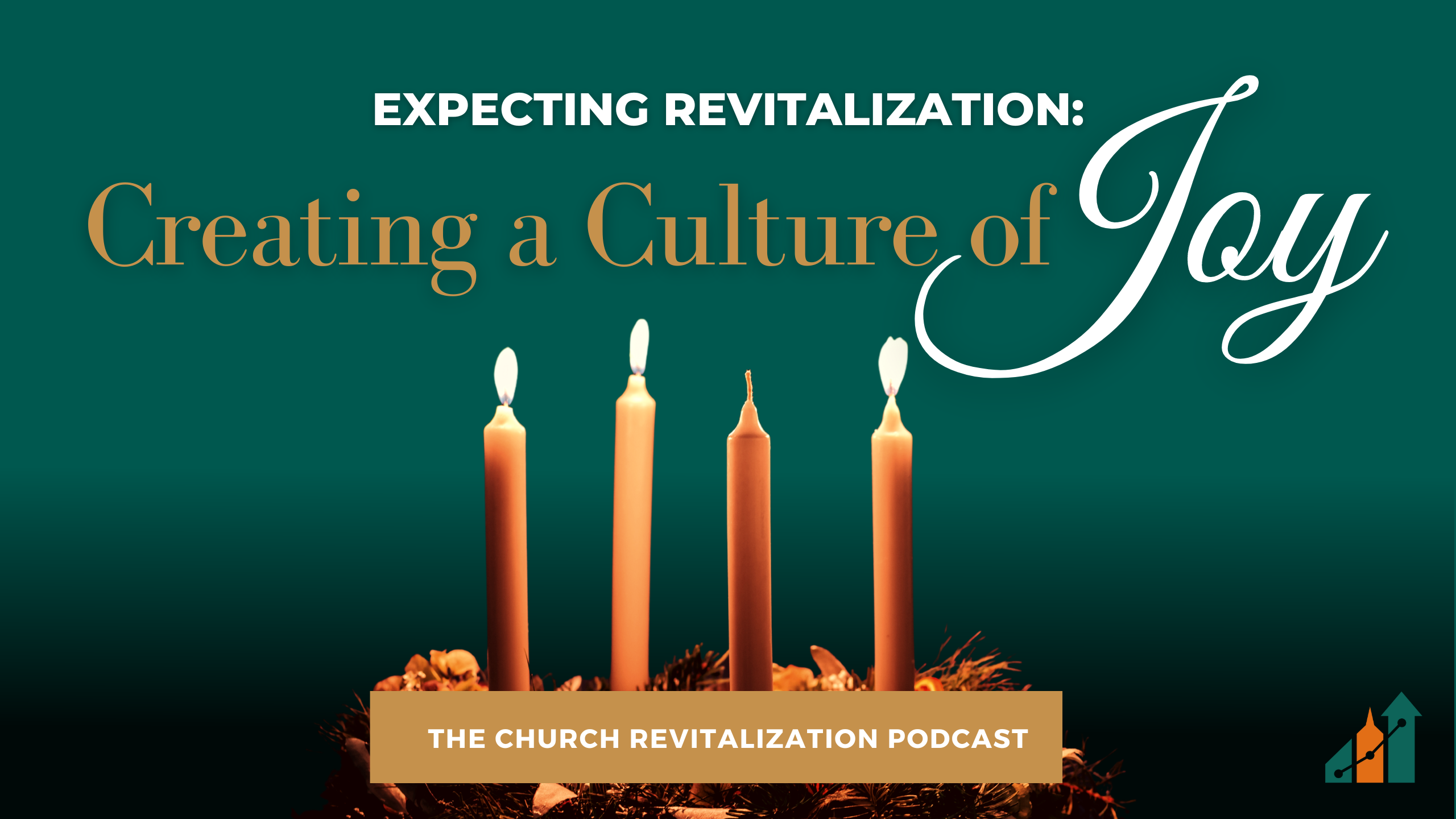The Church Revitalization Podcast – Episode 170
This past weekend, I had the opportunity to be on-site with a church that I started working with three years ago, Cape Carteret Baptist Church. They’ve occasionally made it into the anecdotes on this podcast, and I usually get a text from someone there when they get a mention. I’m naming them today because they’re an excellent example of how joy can change the culture of a church.
Three years ago, it would be safe to say that Cape Carteret was a church that had lost its joy. It was facing a number of specific challenges, and its leaders were feeling pressed and burned out. After going through our Church Ministry Analysis process, they accepted our recommendation to go through the Strategic Envisioning process to address these challenges. Despite the fact the pandemic began a month after they approved the Strategic Envisioning process and could have backed out at that time, they chose to move forward. We figured out how to make the process work in the face of the public health challenges.
The church did the work. They confronted difficult decisions, bad habits, and broken systems. They renewed their commitment to the promise of Jesus that the gates of hell cannot stop a church that goes on offense. They refined their Great Commission mission, assessed their values, aligned their discipleship pathway, and discerned God’s vision for their church. They got serious about communicating their priorities to the congregation, and proved their commitment through the decisions they made.
Subscribe below to never miss an episode.
As a result, the church is now very healthy. When the pandemic waned, the church not only rebounded to its pre-pandemic size, it exceeded it. New attenders started volunteering, joined groups, and got serious about sharing their faith with their friends and neighbors. Dozens and dozens of people have made faith decisions in the last two years.
This past Sunday, as I attended their services—one word described the feeling at Cape Carteret Baptist Church: joy.
But this joy doesn’t exist because things are healthy now. No. The opposite. Their health has come from their joy, which is rooted in something much deeper, more stable, and less liable to be affected by a low-attendance weekend. Their joy pre-dated the fruit of their health.
Churches that want to experience revitalization need to get serious about becoming a place filled with joy. This joy is available to all churches—but it takes hard work to tap into the source. Below, we’ll explore how your church can experience joy and how it can transform your church.
Joy Springs from Hope
In the first installment of this series, we made the case that anticipating that your church could expect revitalization when it stands on the promises of Jesus is not only reasonable—it’s inevitable! Certainly, this is a bold claim, but one that we firmly stand by. The reality is that joy is impossible without hope. Joy springs from the confidence that hope brings.
In the book of Revelation, we read letters written to seven churches. All but one of them received criticism from Jesus. They had varying degrees of dysfunction and theological malpractice. But regardless of the situation, each letter is concluded with a promise written “to those who overcome” or “the one that conquers.” The significance of this is enormous.
I regularly meet pastors and church leaders who blame all of their problems on the problem people in their churches. They say that it’s impossible to lead the stiff-necked people, and use the challenges of leadership as an excuse for a lack of joy, hope, peace, and love. But Jesus makes it clear that no matter what the situation is in your church, there is always an opportunity for you to overcome. Change is always open to those who pursue it.
In each letter, Jesus makes a promise to those that overcome:
– That they will “eat of of the tree of life, which is in the paradise of God” (2:7)
– That they will “will not be hurt by the second death” (2:11)
– That they will receive “some of the hidden manna, and [receive] a white stone, with a new name written on the stone that no one knows except the one who receives it.” (2:17)
– That they will be “[given] authority over the nations” and “the morning star” (2:26, 28)
– That they will be “clothed thus in white garments, and [God] will never blot his name out of the book of life” and Jesus will “confess his name before [the] Father and before his angels.” (3:5)
– That they will be made “a pillar in the temple of my God. Never shall he go out of it…] (3:12)
– That they will “sit with [Jesus] on [his] throne…” (3:21)
These promises are given to those who are a part of some very dysfunctional churches! Therefore, pastors, you have no excuse for not choosing joy. Your joy cannot be tethered to the existence (or lack) of problems or problem people. Instead, joy springs from confidence in God making good on His promises, regardless of our situation.
Joy Is Contagious
The truth is that if you will choose joy, your church will begin to reflect back the same attitude. This will be difficult for many pastors to accept, but the truth is that many churches are such joyless places because they are led by joyless pastors.
The reality of joyless pastors is understandable on a worldly level, because so many churches are plagued by declining attendance, lost influence in the culture, and an internal focus. But as we’ve already covered, our joy cannot be rooted in our situation. Our joy must have supernatural, spiritual, Biblical origins. Ironically, when you begin to choose to walk in the joy that comes from the Spirit, the problems start to diminish. Of course, trouble will be ever-present to some degree. But when your church begins to reflect the joy of the Spirit, it begins to establish a new culture.
It goes without saying, perhaps, that joylessness is also contagious. Therefore, it is incumbent on pastors and their leadership teams to do a check on their culture. Is it joy-filled or joyless?
Joy Is a Witness to a Cynical World
The one thing that our culture might lack the most is joy—true joy. Our culture lacks joy because we have false hopes—ones built on wishes and human effort. We lack joy because we think that peace can only come from a lack of conflict. Likewise, the world believes that joy is the equivalent of feeling happy.
Therefore the lack of genuine hope and true peace breeds cynicism. At its roots, cynicism is a deep unbelief that anything is really good, true, and beautiful. If a person is joyful, it cannot be real. It must be an act.
When a church begins to reflect joy in a real way, filled with integrity, this becomes a witness to our world. Finding true joy in a dark world is one of the greatest ways to prove to our world that Jesus is risen and returning. While we should not be ignorant of Scripture, our joy is our greatest apologetic. No one wants to follow a God who will make them more depressed than they already are. When your church walks in a spirit of joy, it is evidence to a watching world that the teachings of Jesus are not only true, but give life to the full.
As the kids would say, joy is a vibe. This is an oversimplification, of course. But the joyfulness of a church is immediately self-evident when you walk in. Lights and fog cannot manufacture it. Killer music and great A/V cannot replicate it. A beautiful hymn sung by a choir in perfect four-part harmony cannot mask joylessness.
Is joy necessary for revitalization? Yes. But joy isn’t an end you can chase. Like hope, joy only comes from a genuine confidence that God’s promises are true, and that when Jesus finally makes good on his promises, everything will be whole and perfect.
BONUS: Watch this episode on YouTube.


Scott Ball is the Vice President and a Lead Guide with The Malphurs Group. He lives in East Tennessee with his wife and two children. (Email Scott).

